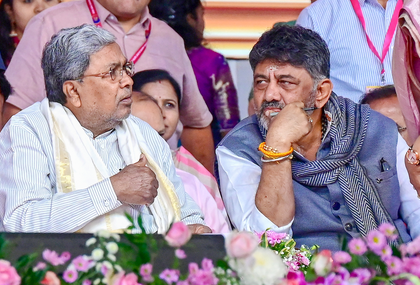Congress leadership struggling to balance loyalties and prevent a Karnataka split
By IANS | Updated: November 28, 2025 17:55 IST2025-11-28T17:51:46+5:302025-11-28T17:55:08+5:30
New Delhi, Nov 28 The Congress is once again facing the Karnataka heat with leadership crisis and open ...

Congress leadership struggling to balance loyalties and prevent a Karnataka split
New Delhi, Nov 28 The Congress is once again facing the Karnataka heat with leadership crisis and open rivalry intensifying between Chief Minister Siddaramaiah and his Deputy D.K. Shivakumar.
The party high command is struggling to balance loyalties and prevent a split amidst a clash rooted in caste equations, class appeal, and competing political bases. The current problem dates back to the 2023 Assembly victory when the party swept to power under Siddaramaiah’s leadership, simultaneously relying heavily on Shivakumar’s organisational skills.
Caught between contradicting claims by the two stalwarts and their followers, an informal understanding was said to have been evolved where Siddaramaiah would serve as Chief Minister for half of the government’s five-year tenure, followed by Shivakumar for the remaining two-and-a-half-year term. Now, with Siddaramaiah having crossed the halfway mark in November 2025, Shivakumar’s camp is pressing hard for a transition.
The other side, meanwhile, is reportedly insisting on completing the full five-year period. Incidentally, a similar conflict was reported between Rajasthan’s then Chief Minister Ashok Gehlot and his deputy Sachin Pilot during Congress rule in the state.
Pilot aspired to become Chief Minister, while Gehlot resisted stepping down. This led to a rebellion in 2020, said to be aimed at toppling the government following years of factional rivalry. This created a major crisis for the Congress government in Rajasthan. That feud became symbolic of the Congress party’s generational divide and continued despite the Congress high command, including Rahul Gandhi’s interventions.
The feud weakened the Congress in Rajasthan, creating instability in the state government and finally in its exit from power. Elsewhere, too, like in Madhya Pradesh and West Bengal, among other states, Congress infighting has led to the waning of the party and subsequent political insignificance.
Meanwhile, in Karnataka, Siddaramaiah reportedly draws his strength from the AHINDA, comprising minorities, backward classes, and Dalits. He is seen as a social justice champion, appealing to rural poor and marginalised groups. His populist schemes, like free rice distribution and social welfare programmes, have helped cement his image as a leader of the masses.
On the other hand, D.K. Shivakumar, a Vokkaliga strongman, represents one of Karnataka’s most influential agrarian castes. His wealth, business networks, and ability to mobilise resources make him the party’s organisational engineer. Thus, he has been the party’s moneybag and troubleshooter – financing campaigns and handling crises – thus earning him leverage with the high command.
While elevating Shivakumar could trigger Vokkaliga consolidation, it would alienate others, like Dalits, Muslims, and OBCs. Further, his aggressive style and reputation for wealth-driven politics may not resonate with poorer sections.
Meanwhile, the open airing of demands and counter-demands has dented the party’s image with MLAs from both camps lobbying in Delhi, creating a perception of instability. Though Congress President Mallikarjun Kharge has acknowledged the crisis and promised intervention, the party high command’s apparent indecision reflects otherwise.
Despite Shivakumar’s request for an audience, Rahul Gandhi has asked him to “wait”, according to reports. Though Shivakumar has publicly said he is “not in a hurry”, his supporters are intensifying pressure, citing the reported CM-for-half-a-term “pact”.
Karnataka, being the Congress’s biggest success amidst a series of political setbacks, a split here would weaken the party nationally.
The Congress high command is preparing to summon both leaders to Delhi for talks, with Kharge, Rahul, and Sonia Gandhi expected to mediate. A mid-term swap, honouring the alleged pact, may appease Shivakumar but would destabilise the base enjoyed by Siddaramaiah. A compromise on a “third name” or a temporary Chief Minister from outside both camps risks weakening Congress’s mass appeal.
Amidst the current scenario, the party high command faces the problem of performing a classic balancing act without even the basic props.
Disclaimer: This post has been auto-published from an agency feed without any modifications to the text and has not been reviewed by an editor
Open in app